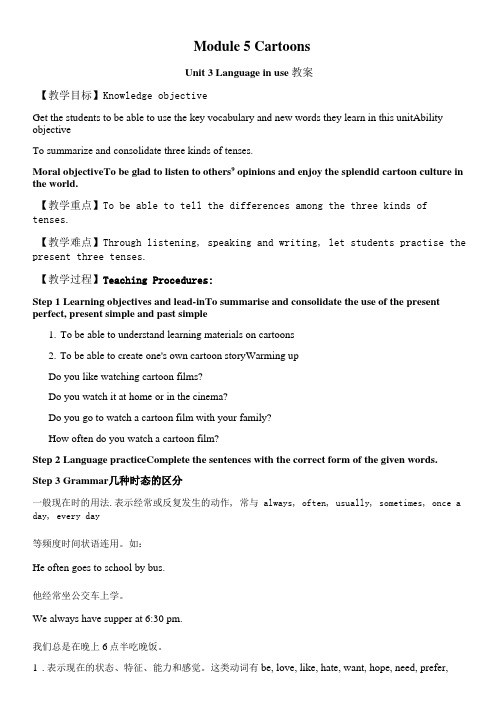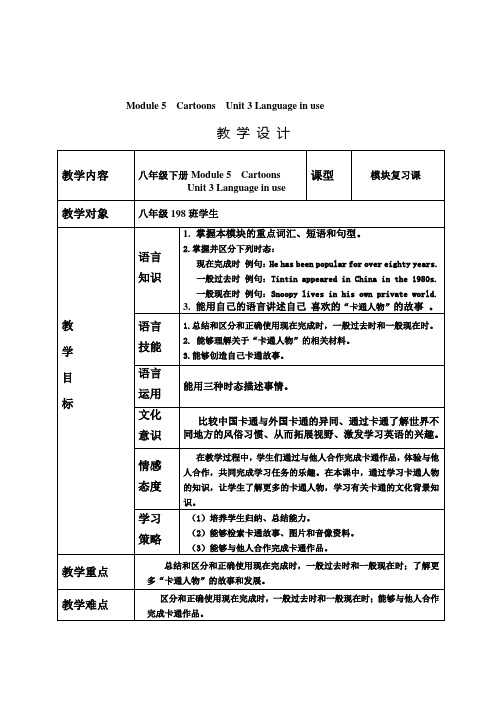八年级英语下册Module5CartoonsUnit3Languageinuse作业课件(新版)外研版
(新版)外研版八年级英语下册Module5CartoonstoriesUnit3Languageinuse

【拓展句】 1. Wonder Park is a fantastic cartoon film directed by Dylan Brown. 《奇迹公园》是由迪伦·布朗执导的一部精彩动画 片。 2. The film tells the story of a creative girl called Joni. 这部电影讲述了一个名叫乔尼的创意女孩的故事。
3. Tintin _a_p_p_e_a_r_e_d_ (appear) in China in the 1980s. 4. He _h_a_s_b_e_e_n_(be) popular for over eighty years. 5. Fans _h_a_v_e_b_o_u_g_h__t (buy) about 200 million copies of Tintin’s stories in more than fifty languages.
【连句成篇】 My favourite cartoon film is Finding Nemo. It’s a
great story about a fish called Nemo. At first, Nemo was just a kid as any kids. He thought he could do everything. When he tried to prove how brave he was, he swam alone far away. Later human caught him. The story tells us how Nemo’s father tried to save his son and
【知识详解·记】 一般现在时、一般过去时和现在完成时从用法、
初中英语外研版八年级下册《Module 5 Cartoon stories Unit 3 Langu

一样将来时表示在将来的某个时间打 算要做的事或对未来的猜测等。如: I’m going to see the XXXrise tomorrow. Robots will help us do lots of heavy jobs in the future. 常用be going to +动原或will+动原构成 Are you going to see the doctor? Will people live on the moon? I’m not going to wear jeans. He won’t come with us.
D:What does Tintin do?
T:He (6)__w_o_r_k_s_ (work) for a newspaper and he (7) ____h_a_s_ (have)
lots of exciting experiences.
D:And (8)__d_o____the storiehsav_e______(have) happy endings?
Grammar
一样现在时与一样将来时
一样现在时表示常常性动作、现 阶段状态或客观真谛等。如: I often have dinner at 6:30. She is a student now. The earth goes around the XXX. 谓语动词用动词原形或第三人称 单数 Do you have dinner at 6:30? Does he have dinner at 6:30? I don’t have dinner at 6:30. He doesn’t have dinner at 6:30.
Module 5 Cartoon stories
八年级英语下册 Module 5 Cartoons Unit 3 Language in use

Unit 3 Language in useⅠ.句型突破1.超人成功帮助了处于险境中的人。
________________________________________________________________________2.我希望能和你一起看电影。
________________________________________________________________________Ⅱ.小试牛刀假如你是Liner,发一封电子邮件邀请你的朋友Ivy,邀请她看Superman这部电影。
(80词)内容包括:你计划下周一晚上看,票价优惠。
看完电影后,一起逛逛街将会很惬意。
周一晚上7:00在学校门口会面。
Dear Ivy,I'm writing this letter to tell you that __________________________________________ __________________________________________________________________________________________________________________________________________________________________________________________________________________________________________________________________________________________Yours,Liner Ⅲ.拓展阅读(A)阅读短文,选择正确答案。
Every year there is a Spring Festival in Chin ually it is in January or February.It is the most important fest ival in China.So before it comes,everyone has to prepare things.They buy pork,beef,chicken,fruits and many other things.And they often make a special kind of food—“dumplings”.It means “come together”.On the day before the festival,parents buy new clothes for their children.On the Spring Festival Eve(除夕),all the family members come back to their hometown.This is a happy moment.Some sing and dance,some play cards and others get the dinner ready.When the y enjoy the meal,they give each other the best wishes for the coming year.They all have a good time.()1.Which is the most important festival in China?A.The MidAutumn Festival.B.The Spring Festival.C.Children's Day.()2.When is the Chinese Spring Festival usually celebrated?A.In March or April.B.In May or June.C.In January or February.()3.______ are a special kind of food for the Spring Festival in China.A.ChickenB.DumplingsC.Fish()4.What's the meaning of the food “dumplings” for Chinese people in the Spring Festival?A.Look up.B.Help yourself.C.Come together.()5.The family ______ when they are having dinne r together on the Spring Festival Eve.A.give each other the best w ishesB.buy presentsC.sing,dance and play cards(B)Once Goethe,the great German poet,was walking in a park.He was thinking about something when he noticed he came to a very narrow(狭窄) road.Just at that time,a young man came towards him from the other end of the road.It was too narrow for both of them to pass through at the same time.They stopped and looked at each other for a while.Then the young man said rudely,“I never make wa y for a fool.” But Goethe smiled and said,“I always do.” Then he turned back quickly and walked toward s the end of the road.1.Where was Goethe walking?________________________________________________________________________2.Who came towards Goethe from the other end of the road?________________________________________________________________________3.Was the road too narrow for both of them to pass through at the same time?________________________________________________________________________4.Did the young man make way for Goethe?________________________________________________________________________5.Who turned back quickly and walked towards the end of the road?________________________________________________________________________参考答案Ⅰ.1.Superman manages to help people who are in danger.2.I wish to go to see a film with you.Ⅱ.Dear_Ivy,I'm writing this letter to tell you that a fantastic film will be on this week.It is called Superman.In this film,Superman manages to help the people who are in danger.How I wish to go to see it with you!Shall we meet on Monday?The tickets are cheaper.Besides,it will be relaxing to go shopping after seeing the film.Let's meet at the school gate at 7:00 p.m.Yours,Liner Ⅲ.(A)1~5 BCBCA(B)1.In a park. 2.A young man.3.Yes,it was. 4.No,he didn't. 5.Goethe.。
浙江省嘉兴市秀洲区八年级英语下册Module5CartoonsUnit3Languageinuse课件新版外研版

⑥He keeps fighting bad people. 他一直和坏人战斗。 ⑦I don’t think we agree. 我想我们观点不一致。 ⑧I can’t help laughing when I watch them. 当我观看它们的时候忍不住发笑。 ⑨They fight a lot. 他们经常打架。 ⑩I think there’s a lesson there! 我认为那有经验教训!
⑮He leads a group of monkeys against the Emperor of Heaven and his men. 他带领一群猴子对抗玉皇大帝和他的侍卫。 ⑯The Monkey King makes a terrible mess in heaven. 美猴王把天宫弄得天翻地覆。 ⑰They always expect to see more Monkey King cartoons. 他们一直期待看到更多美猴王的卡通片。
(2)有些动词的现在完成时可表示从过去某一时间 开始一直持续到现在(包括现在在内)的动作或状态, 可以和表示一段时间的状语连用。表示动作或状态的 动词多是延续性动词。如: ①I have taught in this school for five years. 我在这个学校教书已有五年了。 ②The Greens have lived in Shanghai since they moved to China. 格林一家人自从搬到中国以来一直住在上海。 ③I’ve known her for a long time. 我认识她很长时间了。
2. 一般过去时的用法 (1)表示过去某个时间所发生的动作或存在的状 态,常和表示过去的时间状语,如yesterday, last week, an hour ago, just now, the other day, in 1982等连 用。如:
初中英语外研版八年级下册《Module 5 Cartoons Unit 3 Language in

难点
1、学会创作自己的英文故事剧本,掌握说明文的文段结构及时态的恰当使用。
2、培养观察归纳、听说读写的综合运用及创新能力。
教学过程
教学环节
教师活动
学生活动
设计意图
Step1:
Warming-up
课前互动
展示任务要求,要求学生跟读模块单词录音。参与记忆游戏,要求学生在3秒内快速说出所见词对应的中文词义及英文拼读。
3、播放视频“大力水手”,指导学生阅读完成Activity 2,提问式核对答案。
4、指导学生限时完成Activity 3的选词填空题,两人组核对答案。
5、展示Activity 4的图片,要求学生快速排序后进行口语表达,播放音频核对答案。两人组完成Activity 5中的问题。
6、展示Activity6的图表填空题,播放录音要求学生限时完成,检查答案。
巩固时态的综合运用。
巩固时态,提高阅读与写作能力。
提高合作能力
提高观察与口语表达能力
提高阅读能力。
拓展阅读知识面。
合作交流,提高口语表达与创新能力,交流学习。
Step3:
Practice
实战演练
课堂练习
完成练习。
巩固重难点。
Step4
Homework
课后巩固
布置作业
选用合适的插图,编写英文动画故事,与同学交流朗读。
4、限时完成Activity 3的选词填空题,两人组核对答案。
5、根据图片快速排序后进行口语表达,听音频核对答案。两人组完成Activity 5。
6、浏览图表填空题,听录音,限时完成,检查答案。
7、快速阅读Around the world.
(推荐)初中英语八年级下册Module 5 《Unit 3 Language in use》

到目前为止,已经学过一般现在时,一 般过去时和现在完成时,如何区分这三 种时态呢?请看下面的句子:
(1) I often watch cartoon films. 我经常看卡通片。
(2) I watched Spiderman last week. 我上周看了《蜘蛛侠》。
(3) I have already watched Spiderman. I do not want to watch it again. 我已经看过《蜘蛛侠》了,不想再看了。
A. does
B. did
C. has done D. will do
3. — What does Tom’s uncle do?
— He is a teacher. He _______ physics
at a school now.
(2013武汉)
A. will teach B. has taught
2. To be able to understand learning materials on cartoons
3. To be able to create one’s own cartoon story
Are you familiar with these sentences? They are all from this module.
C. teaches D. taught
4. — Where were you last Saturday?
— I ______ in the Capital Museum.
(2012北京)
A. am
B. will be
C. was
D. have been
5. I have been to Shanghai. I _____ there
外研版八年级英语下册Module 5 Cartoons《Unit 3 Language in use》教案

外研版八年级英语下册Module 5 Cartoons Unit 3 Language in use【教材简析】外研版八年级英语下册Module 5 Cartoons 是以卡通故事为话题,而卡通故事是少年儿童喜欢的话题,每个学生都有自己喜欢的卡通故事,所以本模块内容能够激发学生的学习兴趣和参与意识。
第一单元是Daming和Tony的对话,两人讨论做完作业后看什么动画片,从对话中可以看出两人的不同爱好。
但最终两从达成一致意见,看《猫和老鼠》。
第二单元介绍了几个很受欢迎的卡通形象,包括了美猴王、史莱克、尼莫、丁丁和史努比等。
这些卡通人物之所以为人们所喜爱的原因,并介绍艺术家创造这些卡通人物背后的故事。
这一模块的语法重点是对不同时态的综合运用,并分清各种时态所运用的地方。
本模块的Leaning to lean专栏中为学生提示了听力技巧,让学生在听听力时,有目的性的听。
Around the world部分介绍了美国比较经典的两个卡通故事。
本模块的任务是要求学生创作自己的卡通作品,分为策划、实施和展示三个步骤。
【教学目标】知识与技能目标:1.语言知识目标:(1)能够谈论卡通片和卡通人物;(2)能够综合运用一般过去时、一般现在时和现在完成时(3)能够根据情感态度的表达确定句子重音;(4)能够识别对话中提及的卡通故事和人物;(5)能够识别说话人对卡通故事及卡通人物的态度;(6)能够询问及回答有关卡通故事和卡通人物的信息;(7)能够读懂以卡通为主题的短文并提取相关信息;(8)能够描写自己喜欢的卡通人物和卡通故事;(9)能够展示卡通故事、介绍卡通作品和演示卡通故事;(10)能够正确运用各种时态。
2.学习策略:(1)能够检索卡通故事、相关图片及音像资料。
(2)能够与他人合作完成卡通作品。
3.文化意识:通过阅读卡通故事了解不同国家的文化。
4.情感态度:(1)能够就卡通故事或卡通人物进行交流,尊重他人的态度,倾听他人的不同意见.(2)能够与他人合作,创作自己的卡通故事.【教学重点】1、训练学生的听、说、读、写能力;2、引导学生有目的的听,培养学生有效的听力学习策略.3.通过任务型阅读教学引导,将复杂的文章简化,帮助学生理清文章的脉络。
仁寿县三中八年级英语下册 Module 5 Cartoons Unit 3 Language in

重点短语more than, next to, in the future, the number of…重点句型1。
He has been popular for over eighty years。
2.Tintin appeared in China in the 1980s.3。
Snoopy lives in his own private world。
重点语法一般现在时、一般过去时和现在完成时的区分自主学习方案学生自学教材〔P38~41〕,找出课文中重点词组和句子,完成教材(P38~41〕的练习题。
课堂导学方案Step 1 情景导入教师要求学生熟读下面的语言训练.〔1〕He has been popular for over eighty years.(2〕Tintin appeared in China in the 1980s。
〔3〕Snoopy lives in his own private world.环节说明:语言训练复习了本模块的语法知识,同时又能帮助学生完本钱课时的任务.Step 2 完成教材1~3的任务1。
用括号内词语的适当形式填空,完成以下对话。
完成任务1,集体核对答案。
2。
用括号内词语的适当形式填空,完成以下文章。
完成任务2,集体核对答案。
4。
小结训练。
用所给动词的正确形式填空.〔1)—When did you write 〔write〕 this song?—I wrote ( write〕 it last year。
〔2〕-Have you ever eaten (eat) chocolate, Lucy?-No, never.环节说明:此环节复习了本模块的重点语法——一般现在时、一般过去时和现在完成时的区别。
Step 3 完成教材4~9的任务1。
仔细观察图片,结对练习,判断图画的最正确顺序.完成任务4,集体核对答案。
2。
再听录音,答复以下问题。
完成任务5,集体核对答案。
外研版八年级下册英语Module 5 Cartoons Unit3 Language in use

A. visited B. were visiting C. visit D. have visited
3. Don’t get off the bus until it___D____. (2020贵州毕节)
A. will stop B. stop C. stopped D. stops
4. I hear that it often ___A____ in Sichuan and there are usually floods, especially in summer. (2020湖北恩施)
结构 主语+was/ were+表语 主语+行为动词过去式…
标志词
two years ago, last week, last year, yesterday, the day before yesterday等
行为动词的过去式变化: 1. 一般在动词词尾直接加ed:
look → looked, listen → listened 2. 以“不发音的字母e”结尾的动词后加d:
9. The film My People, My Country, which amazed lots of
movie-goers, ____B___ to the top of the Chinese box
office last Monday. (2020湖南长沙)
A. jump
B. jumped
Module 5 Cartoons
Unit 3
Complete the sentences with the correct form of the given words.
1. He _h_a_s_b_e_e_n__ popular for over eighty years. (be) 2. Tintin _a_p_p_e_a_r_e_d_ in China in the 1980s. (appear) 3. Snoopy __li_v_e_s__ in his own private world. (live)
【备课】年春外研版英语八年级下册Module5Unit3--教案

Module 5 CartoonsUnit 3 Language in use 教案【教学目标】Knowledge objectiveGet the students to be able to use the key vocabulary and new words they learn in this unitAbility objectiveTo summarize and consolidate three kinds of tenses.Moral objectiveTo be glad to listen to others9 opinions and enjoy the splendid cartoon culture in the world.【教学重点】To be able to tell the differences among the three kinds of tenses.【教学难点】Through listening, speaking and writing, let students practise the present three tenses.【教学过程】Teaching Procedures:Step 1 Learning objectives and lead-inTo summarise and consolidate the use of the present perfect, present simple and past simple1.To be able to understand learning materials on cartoons2.To be able to create one's own cartoon storyWarming upDo you like watching cartoon films?Do you watch it at home or in the cinema?Do you go to watch a cartoon film with your family?How often do you watch a cartoon film?Step 2 Language practiceComplete the sentences with the correct form of the given words.Step 3 Grammar几种时态的区分一般现在时的用法.表示经常或反复发生的动作, 常与 always, often, usually, sometimes, once a day, every day等频度时间状语连用。
外研版八年级英语下册Module 5 Cartoons M5 Unit 3 Language in use (2)

Unit 3 Language in useⅠ.用所给词的适当形式填空。
1. —Do you know the Englishman?—Yes. I ________ (know) him for two years.2. —________ (have) he been to the Central Park?—Yes, he has.3. Mr.Robert ________ (watch) TV last night.4. I ____________ (not write) down your names yet.5. —How many schools ______ Project Hope ______(build) since 1980?—Sorry, I don't know.6. He ________ (sit) down and began to read the newspaper.7. He ________(go) swimming in the river every day in summer.8. —May I speak to Jack?—Sorry, he's ________ (go) to Paris and will be back in 2 weeks.9. I ________ never ________(eat) such delicious noodles before.10. We ______________(see) several members of the family since we________(arrive).Ⅱ.单项选择。
11. The teacher said that the sun ________ in the east and ________ inthe west.A. rose; setB. rises; setsC. raises; setsD. raised; set12.—I ________ to the cinema yesterday.—It's a pity. You didn't invite me.A. goB. wentC. have gone13. —Mike, why are you watching TV again?—I ________ my homework.A. finishB. finishedC. have finishedD. had finished14. My grandmother ________ in Yangzhou. She was born there and hasnever lived anywhere else.A. livedB. livesC. was livingD. will live15. —Y unnan is very beautiful. I ________ there last year.—Yes, I ________ there twice.A. went; have goneB. went; have beenC. have gone; wentD. have been; went16. Don't worry. Bill will help you look after your dog when you________ away on business.A. areB. wereC. will beD. have been答案Ⅰ.1.have known 2.Has 3.watched 4.haven't wrote5. has; built6.sat7.goes8.gone9.have; eaten10. have seen; arrivedⅡ.11.B 12.B 13.C 14.B 15.B16. A点拨:when引导的时间状语从句,遵循主将从现的规则,故此处用一般现在时。
八年级英语下册Module5CartoonsUnit3Languageinuse教学设计

Module 5 Cartoons Unit 3 Language in use教学设计一般现在时的用法(1)表示经常性、习惯性的动作或经常存在的状态;(2)表示客观真理、客观存在及自然现象;(3)用于时间状语从句或条件状语从句中,代替一般将来时;(4)表示按时间表拟定的、安排好的事情或要发生的动作。
考点1考向一【探究总结】考向二一般现在时的构成every day (week/month/year/...);today ,always ,often 等。
考向三常见标志词典例1Grandpaglasses when he reads.A.wearsB.woreC.has wornD.was wearingA【点拨】由when he reads 可知主句表达的是动作的经常性。
典例2Many city people their bikesto work every day.A.ride B.will ride C.rode D.have riddenA 【点拨】此题用关键词法。
由句中的关键词every day 可判断本句时态为一般现在时,且主语为集合名词,故动词应用原形。
•一般过去时的用法(1)表示过去某个时间发生的动作或存在的状态;(2)过去经常性或习惯性发生的动作或存在的状态;(3)由when ,while ,before 或after 等引导的表示过去时间的状语从句。
考点2考向一一般过去时的构成常见标志词或词组(1)last 系列:last week/month/year/Sunday/...(2)ago 系列:two days/three hours/...ago(3)yesterday 系列:yesterday/the day before yesterday 等。
考向三考向二典例1I still remember my happy childhood when mymother ___ me to Disneyland at weekends.A.takesB.tookC.will takeD.has takenB 【点拨】由语境“我仍记得我快乐的童年”可知应用一般过去时。
八年级英语下册Module5CartoonstoriesUnit3Languageinuse练习外

2017-2018学年八年级英语下册Module 5 Cartoon stories Unit 3 Language in use同步练习(新版)外研版编辑整理:尊敬的读者朋友们:这里是精品文档编辑中心,本文档内容是由我和我的同事精心编辑整理后发布的,发布之前我们对文中内容进行仔细校对,但是难免会有疏漏的地方,但是任然希望(2017-2018学年八年级英语下册Module 5 Cartoon stories Unit 3 Language in use同步练习(新版)外研版)的内容能够给您的工作和学习带来便利。
同时也真诚的希望收到您的建议和反馈,这将是我们进步的源泉,前进的动力。
本文可编辑可修改,如果觉得对您有帮助请收藏以便随时查阅,最后祝您生活愉快业绩进步,以下为2017-2018学年八年级英语下册Module 5 Cartoon stories Unit 3 Language in use同步练习(新版)外研版的全部内容。
Unit 3Ⅰ。
根据句意及括号内所给动词的提示,用适当的时态填空.1。
His father ________(live) in Sydney for ten years。
2。
Last night he ________(read) a funny story。
3。
Mr Green ________(work) in this factory since last year.4。
Do you mind if I ________(borrow) your money?5. When I have problems, my brother always ________(appear) in front of me.Ⅱ. 根据汉语意思完成英语句子,每空一词。
1. 从那以后,我爱上了运动。
I have loved sport _______ _______。
2. 我小时候擅长跑步。
